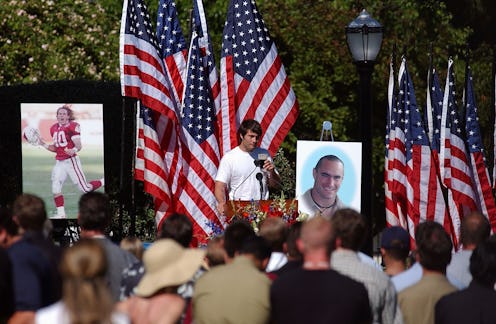News
What We've Learned Since Pat Tillman's Death
Tuesday marks the 10-year anniversary of the death of Pat Tillman, the former Arizona Cardinals NFL star who gave up a life of wealth and fame to join the Army and fight in Afghanistan, and lost his life. Initially reported to the American press as having been slain in a firefight with Taliban fighters, the truth was much different — Tillman was killed in a hail of friendly fire by American forces. The subsequent cover-up and suppression of the true details of his death sparked a major scandal, which rocked the upper echelons of American military leadership, and left many questions unanswered, even now.
Speaking to ESPN's Outside The Lines in an interview which aired Sunday, 33-year-old ex-Army ranger Steven Elliott brought the 'friendly fire' issue to the forefront. Elliott admitted that he may have been the one who killed Tillman in Afghanistan on April 22, 2004, though he can't be sure — multiple members of his platoon were firing on Tillman's location, seemingly mistaking him for an enemy fighter. "It is possible, in my mind, that I hit him," Elliott said.
So, just how common are friendly fire incidents, and how have things changed since Tillman's death a decade ago? Have they changed at all?
There have been 24 friendly fire incidents in Afghanistan since the invasion by international forces in 2001. Of those 24, eight involve attacks by American forces, just three of those against other Americans, with foreign allied forces bearing the worst brunt of the U.S. military's mistakes.
In Iraq, the statistics are similar. Since 2003, 13 incidents have been reported, eight of them committed by U.S. forces, just four against fellow Americans. In full, it's positive news: The military reports suggest rates of friendly fire are lower now on the modern battlefield than almost ever before.
That said, how big the problem is, and whether it's meaningfully improved since 2004 may well be unknowable — given that the Army attempted initially to conceal the true cause of Tillman's death, it raises the very real question of how much trust can be placed in the military's self-reported figures. Indeed, credible reporting suggests this sort of thing may go on more than the military is willing to admit.
Which is, in a way, one of the most lasting legacies that Pat Tillman left. Tillman was a difficult man to describe and epitomize, a former football star who became a ranger in the aftermath of 9/11 and ultimately turned against the war, calling it "f*cking illegal" and planning a post-service sit-down with famed anti-war leftist intellectual Noam Chomsky.
A tough guy to sum up— far tougher than to pin a medal to his body, claim he was killed by the enemy, and move along. Which might have worked, had his endlessly resilient family not had their say.
